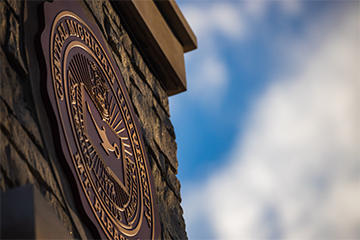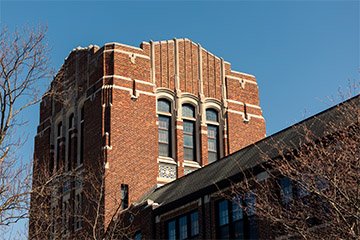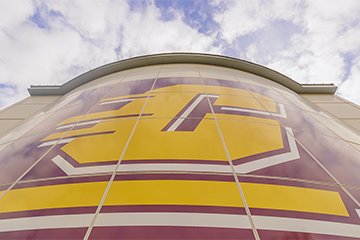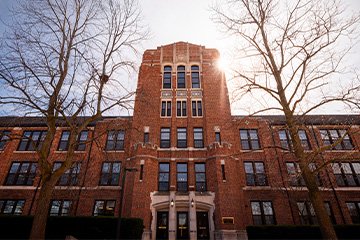CMU Trustees adopt budget to support strategic priorities
New tuition, housing and food rates continue to reflect value
The Central Michigan University Board of Trustees voted Tuesday to adopt a new $443.2 million operating budget for fiscal year 2024-2025 that will allow the university to continue to provide outstanding academic programs and important student services and to invest in key strategic priorities. Trustees also approved tuition, housing and food rates for the upcoming academic year.
Budget plan and priorities
Investments in the operating budget align with CMU’s strategic plan, according to Vice President of Finance and Administrative Services Mary Hill. The budget includes investments in academic programs such as health professions, the Institute for Transformative Dialogue, the recently launched Public and Applied Liberal Arts program and the state’s only accredited online counseling program. The budget also prioritizes several university-wide diversity initiatives, as well as critical student support services in the Division of Student Affairs, such as the Counseling Center and mental health first-aid training for staff.
The budget was formulated as universities and businesses nationwide continue to face price inflation and higher employee and insurance costs. CMU President Bob Davies called the operating budget a responsible one that reflects the work of faculty, staff and administrators to realize cost savings and efficiencies wherever possible.
“After several years of very deep cuts, I am pleased this year to tell you the cuts that have been made are somewhat minimal because of actions we have taken in the past,” Trustee Edward Plawecki, Jr. said. “We believe the actions we take today will keep Central Michigan University in a very strong financial position into the future.”
Tuition and fees
As it does each summer, the CMU Board of Trustees also voted on tuition rates for the coming academic year.
Following a presentation by Vice President Hill, the board approved a tuition increase of $19 per credit hour for domestic lower-level undergraduate tuition. Rates will also increase:
- $27 per credit hour for domestic upper-level undergraduate tuition
- $35 per credit hour for standard master’s program tuition
- $37 per credit hour for doctoral program tuition
International tuition rates also increased $25 per credit hour for undergraduate and between $40-$43 per credit hour for graduate programs.
Trustees did not raise the student services fee.
Hill said on average, Michigan public universities increased tuition more than 25% since 2016, but CMU has kept increases below 17%. She said CMU has the second-lowest cumulative tuition rate increase among all Michigan public universities since 2016, and that this year’s rate changes should fall within the state’s tuition restraint cap, which has not yet been set.
The proposed tuition rates announced today were built into the financial aid packages already sent out to students. Additionally, students with the greatest financial need are still eligible to attend CMU tuition-free through the CMU Tuition Advantage program, Hill said.
Currently, 88% of CMU undergraduate students receive financial aid from federal, state and CMU sources. 81% of undergraduates at CMU receive financial aid that does not need to be paid back, lessening the burden of loans, Davies said.
Davies said the value of earning a CMU degree remains unquestionable. Citing the U.S. Bureau of Labor Statistics, Davies emphasized that those with a college degree will earn over a million dollars more in their lifetime than those without a college degree. He also cited CMU’s First Destination Survey, which found nearly 94% of CMU graduates are employed or are continuing their education within six months of graduation.
“Even with necessary tuition, housing and food rate adjustments, CMU remains an outstanding value for students and their families. CMU's tuition remains competitive among Michigan's public institutions and continues to provide outstanding housing and food options,” Davies said.
Housing and food rates
Trustees also voted to approve proposed housing and food rate changes.
Housing and food rates will increase an average of 4.8% this fall, with an option for returning students that has no price increase.
The housing options now include 4-person and 2-person standard rooms, rooms with larger beds, rooms with air conditioning and single-occupancy rooms. Hill said the goal was to provide students with options so they could choose the living arrangement best suited to their needs and preferences.
Meal plans also were restructured so all three residential meal plans – All Access, Central 16 and Central 12 – are now offered for the same price and all include popular flex dollars.
“Like tuition, CMU works hard to keep housing and food rates reasonable,” Hill said. “CMU is in the lower half (of housing and food costs) as compared with other public universities in Michigan.”
Enrollment, retention and financial aid update
During the meeting of the Academic and Student Affairs Committee on Monday, Vice President of Student Recruitment and Retention Jennifer DeHaemers provided an update on enrollment and retention.
“The bottom line is our enrollment is looking really good for this fall,” DeHaemers said.
DeHaemers said intense efforts in recruitment continue to result in positive enrollment trends, and CMU fully expects to meet and surpass its enrollment goals. She said all metrics for new, first-time-in-any-college and new transfer students are trending in a positive direction for the fall semester, citing a double-digit increase compared to the same time last year.
Additionally, she said CMU’s retention rate has increased 1.2% in the last year. With new enrollment and higher retention, DeHaemers said she is hopeful CMU will see its overall enrollment increase in the fall.
Despite challenges with the national rollout of the Free Application for Federal Student Aid, or FAFSA, DeHaemers said CMU has sent out 13,982 financial aid packages, and the turnaround rate to send offers is just 24 hours from the time CMU receives a potential student’s FAFSA information.
“All indications are that we’re going to see the third year of increases in freshman and transfer students,” DeHaemers said. “We have a lot of reason to be optimistic about our headcount and credit hours for this coming fall.”
President’s report to Trustees
President Davies began his report to the CMU Board of Trustees by congratulating Trustee Edward Plawecki, Jr. who will receive the 2024 Frank J. Kelley Distinguished Public Service Award by the State Bar of Michigan. The honor is awarded to those who demonstrate the highest standards of integrity, fairness, leadership, and dedication to the ideals of democracy.
“We are fortunate to benefit from your dedication to serving others,” Davies told Trustee Plawecki.
Davies recognized and thanked Don Uzarski, who is stepping down as director of the CMU Biological Station, and Tom Masterson, who is returning to faculty after serving as Dean of The Herbert H. and Grace A. Dow College of Health Professions.
Davies also shared the results of the latest National Study of Learning, Voting and Engagement report, which shows that CMU student voter participation has jumped 11% since 2018. The report also showed CMU student voting rates exceed the national average by 15%. Davies offered the findings as proof that CMU students are more civically engaged than their peers at other institutions.
Davies also updated Trustees on university events since their last meeting in April. He praised the Office of Institutional Diversity, Equity and Inclusion for the successful CMU Diversity Symposium in April and the Juneteenth celebration attended by many community members.
A fundraising record
During Monday’s Finance and Facilities Committee meeting, Vice President of University Advancement Jennifer Cotter announced that CMU is prepared to close its most successful fundraising year in history.
In formal session Tuesday, President Davies reported that, as of that morning, CMU raised over $25.4 million for the fiscal year, significantly exceeding the university’s goal of $22.5 million.
“These results mean more support for our most important stakeholders, our current and future students,” said Trustee Emerita and Chair of CMU’s Advancement Board Sarah Opperman. “Advancement at CMU is the strongest I have seen in four decades. Our secret to bringing in donations is simple: introduce potential donors to our students.”
Academic vision update
Provost and Executive Vice President Nancy Mathews presented an update on CMU’s new 20-year academic vision, entitled “Elevating the Human Condition," to the Academic and Student Affairs Committee on Monday.
The draft vision employs six strategies for transformational change over the next 20 years, and will include an implementation plan.
Student Affairs update
In his report to the Academic and Student Affairs committee Monday, Interim Vice President of Student Affairs Stan Shingles laid out five priorities his division is focusing on, including filling vacant positions and providing mental health training for all Student Affairs staff
Shingles said the mental health first-aid training is led by CMU Counseling Center staff, ensuring that Student Affairs staff are prepared to help students who are struggling. He said 99% of Student Affairs staff have already signed up for the training.
“We’re confident this effort will allow us to better identify and support mental health issues on our campus that impact our students and other members of the university community,” Shingles said.
Shingles also reported that CMU has hired a new Director for CMU’s Office of Indigenous Affairs following a national search. Kasey Perez is leading CMU’s programs and initiatives related to the Indigenous community and culture.
“Kasey has hit the ground running, and we are fortunate to have her in this role,” Shingles said.
Melissa Hutchinson, executive director of the CMU Counseling Center, and counselor Elizabeth Husbands also provided an update to the Academic and Student Affairs Committee.
They said that the addition of an embedded counselor in the Student Center for Inclusion and Diversity has been an overwhelming success, making outreach and support more accessible to underrepresented and historically marginalized students.
“Supporting our diverse student body and meeting their mental health needs requires us to be flexible and constantly evaluating what we’re doing, because the needs are constantly changing,” Hutchinson said.
The CMU Counseling Center has secured permanent funding for a 24/7 crisis intervention service for after-hours support, including suicide prevention. Hutchinson said the service is already in place and has been used 40 times in the last year, with two students receiving intervention by emergency responders.
“This is an investment I am thrilled to see come to fruition permanently,” Hutchinson said.
With these new initiatives and continuing outreach to the campus community, Hutchinson said the Counseling Center has not had a waitlist in several years.
In an update on the student food pantry, Interim Director of the Mary Ellen Brandell Volunteer Center Symantha Dattilo said there has been a tremendous increase in demand for the pantry’s services. To meet that demand, Dattilo said the pantry is now open five days per week instead of three during the academic year. They also have formed partnerships with local and national distributors to increase their supply of food while lowering expenses.
Dattilo said the university’s advancement team had been instrumental in raising support for the student food pantry.
Information technology upgrade
Trustees approved funding for a significant investment in CMU’s campus information technology infrastructure to replace aging equipment, improve the integrity of CMU’s network, and enhance security. Trustees approved a proposal to enter a multi-year partnership with Hewlett-Packard to upgrade equipment campuswide and at remote locations in the coming months.
Student fee changes
In response to concerns raised earlier this year by the Student Government Association, President Davies said, “I have approved a proposal to eliminate the $50 non-refundable withdrawal fee and to restructure our tuition refund policy to achieve consistency for students taking classes online and those who are studying on campus.”
Effective this fall, all students who drop or withdraw from one or more courses during the second week of the semester will receive a 50% credit of tuition and fees. Previously there was no refund past the first week of classes for on-campus students.
The Board of Trustees also approved a new student sustainability fee proposed by SGA. The optional $5 per semester fee will be used for sustainability projects and will be administered by a committee of seven elected students. Students can opt out of the sustainability fee at the beginning of the semester.
Presidential search progress
Chair of the Presidential Search Advisory Committee, Trustee Denise Williams Mallett provided an update on the university’s effort to select the next president. She said the search effort has hit several important milestones in recent weeks, and there has been significant progress in reaching potential presidential candidates.
Trustee Williams Mallett said the presidential leadership profile, which outlines the desired qualities and qualifications of CMU’s next president, was released in May. Additionally, she said CMU is using targeted advertising in specialized media outlets to reach a diverse pool of potential leaders. Outreach efforts have resulted in contact with over 3,000 individuals so far, Williams Mallett said.
She also noted several target dates in the presidential search process, including:
- 7/24 – Deadline for potential candidates to apply.
- 8/7 – Presidential Search Committee meets to discuss and select candidates to advance to the first round of interviews.
- 8/20-8/21 – First round of interviews involving 10 to 12 candidates.
The full Board of Trustees plans to interview candidates who advance to the second round in September.
“We are committed to maintaining transparency and engagement throughout the process,” Trustee Williams Mallet said. “I encourage all of our community members to visit the presidential search landing page as we move forward in selecting a leader who will shape the future of our institution.”
Additional board activity
In an update from the Enterprise Risk committee, Trustee Todd Anson reported on the university’s continued engagement with community partners in the Medical Diamond project, located in Saginaw. As Michigan’s demand for physicians grows, and to accommodate increasing student interest in the CMU College of Medicine, the Trustees have charged the university to explore opportunities to strengthen and expand medical education within the Great Lakes Bay region.
The CMU Board of Trustees approved or accepted several other items Tuesday, including:
- Updated traffic ordinances and campus map to reflect current campus buildings and parking lots.
- Increased minimum gift amounts for naming endowed scholarships and programs.
- New endowments and endowment criteria changes.
- Emeritus rank for Harley Blake, Tamara Jetton and Phillip Lundquist.
- Naming of the press dining area in Kelly/Shorts Stadium in honor of Max & Emily’s.
- Public school academy activities.
- Advancement private support report.
An electronic copy of the president’s report will soon be available on the Office of the President web page, and meeting minutes will be added to the Board of Trustees webpage following their approval at the next meeting.




